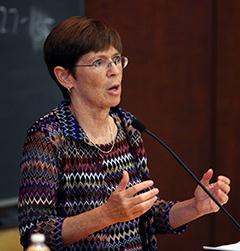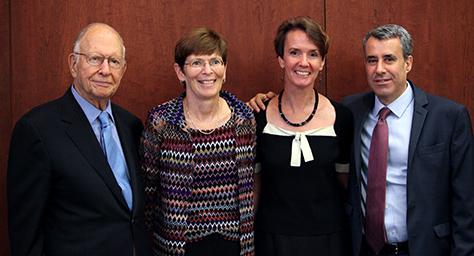The Role of the World Court
Joan Donoghue, U.S. Judge on the International Court of Justice, Discusses the Court's Role as Part of the Center on Global Governance's Fall Speaker Series at Columbia Law School.
New York, September 17, 2013—The International Court of Justice (ICJ) has an impact far beyond states that consent to its jurisdiction, said Joan Donoghue, the sole U.S. judge on the court and the first American woman in that role, in a Sept. 11 presentation at Columbia Law School.
| Judge Joan Donoghue |
Professor Emeritus Richard N. Gardner, co-chair of the Center on Global Governance which sponsored the event, introduced Donoghue before her talk, titled “The Role of the World Court Today.” He noted that Donoghue’s speech was especially timely, coming on the anniversary of 9/11 and with tensions running high in the Middle East.
The 15-member ICJ, or World Court, is the principal judicial organ of the United Nations, seated at The Hague in the Netherlands. It is charged with settling legal disputes submitted to it by states and giving advisory opinions on legal questions from U.N. bodies and agencies.
Addressing the common critique that non-consenting states can simply disregard ICJ rulings, Donoghue referenced the famous quote from legendary Columbia Law School Professor Louis Henkin that “almost all nations observe almost all principles of international law and almost all of their obligations almost all the time.” She said that the ICJ’s role is both smaller and larger than supporters and skeptics often imagine.
“In the nickname ‘World Court’ there is a tension between the word ‘World’ and the word ‘Court,’” Donoghue said, describing the extensive and collaborative review process for each case. “The Court is not intended to settle many cases a year when you look at its structure and processes.”
Instead, she said, the ICJ works not only on peaceful settlements between participating states, but also on advising the United Nations, developing a body of international law, and promoting norms to influence the behavior of states that have not consented to jurisdiction, including the United States.
“The compulsory jurisdiction mechanism is a fraction of ICJ business,” Donoghue said. “International law is very decentralized.”
| (left to right) Professor Emeritus Richard N. Gardner, Judge Donoghue, Professor Sarah Cleveland, and Visiting Professor Sir Daniel Bethlehem |
Donoghue was elected to the ICJ by the U.N. General Assembly and Security Council in 2010. Previously, she had a long and distinguished career as a senior attorney in the U.S. government. She has taught at the University of California, Berkeley; Georgetown University; and George Washington University.
Donoghue’s presentation was part of the fall speaker series from the Law School’s Center on Global Governance.
Donoghue’s presentation was part of the fall speaker series from the Law School’s Center on Global Governance.

